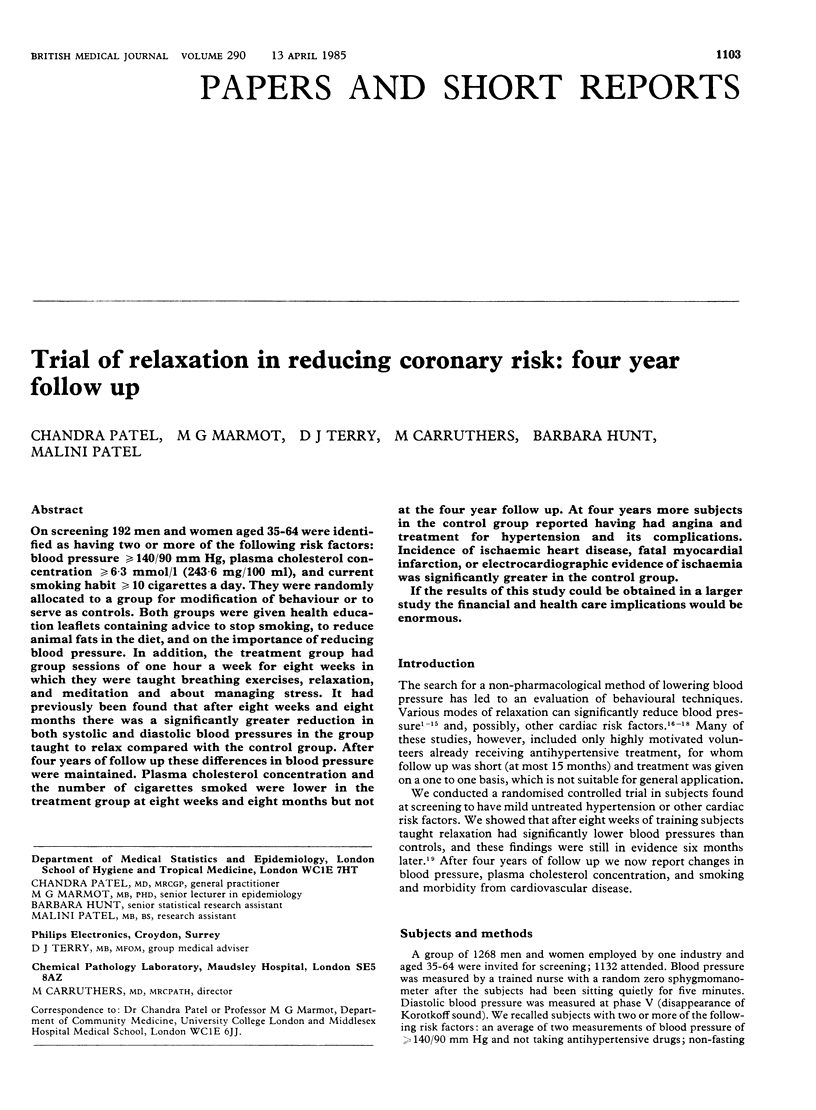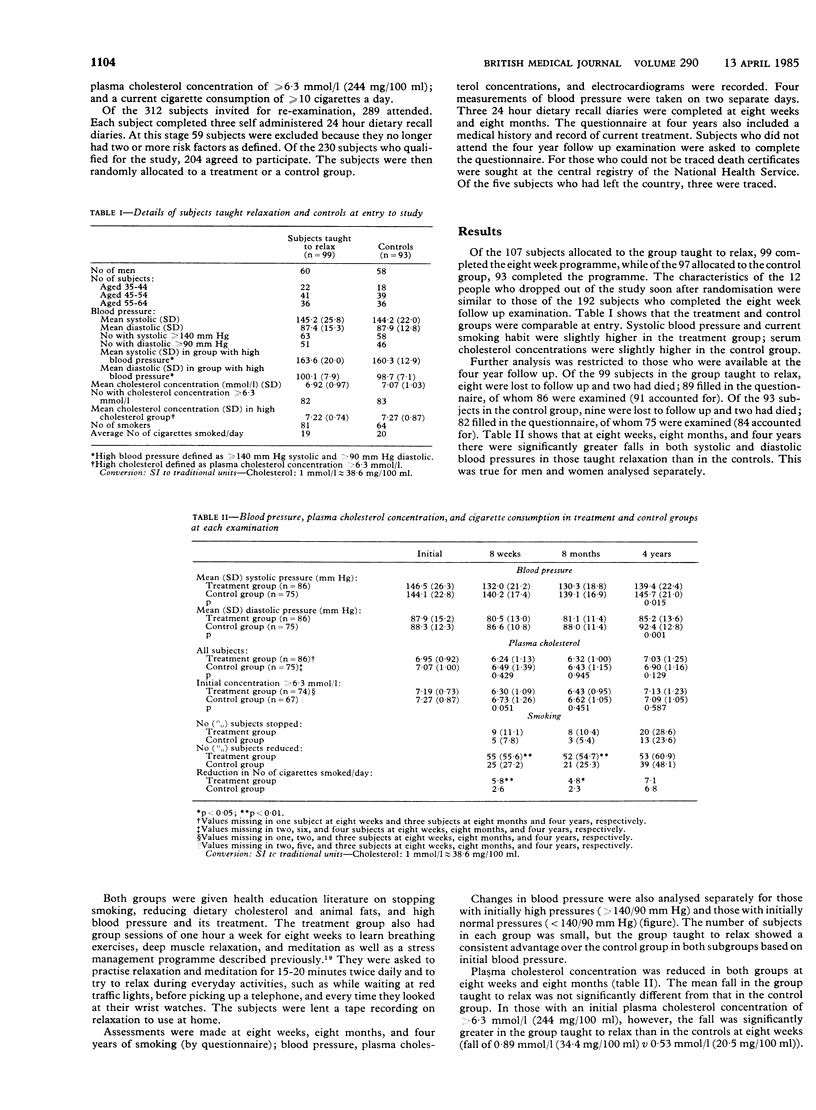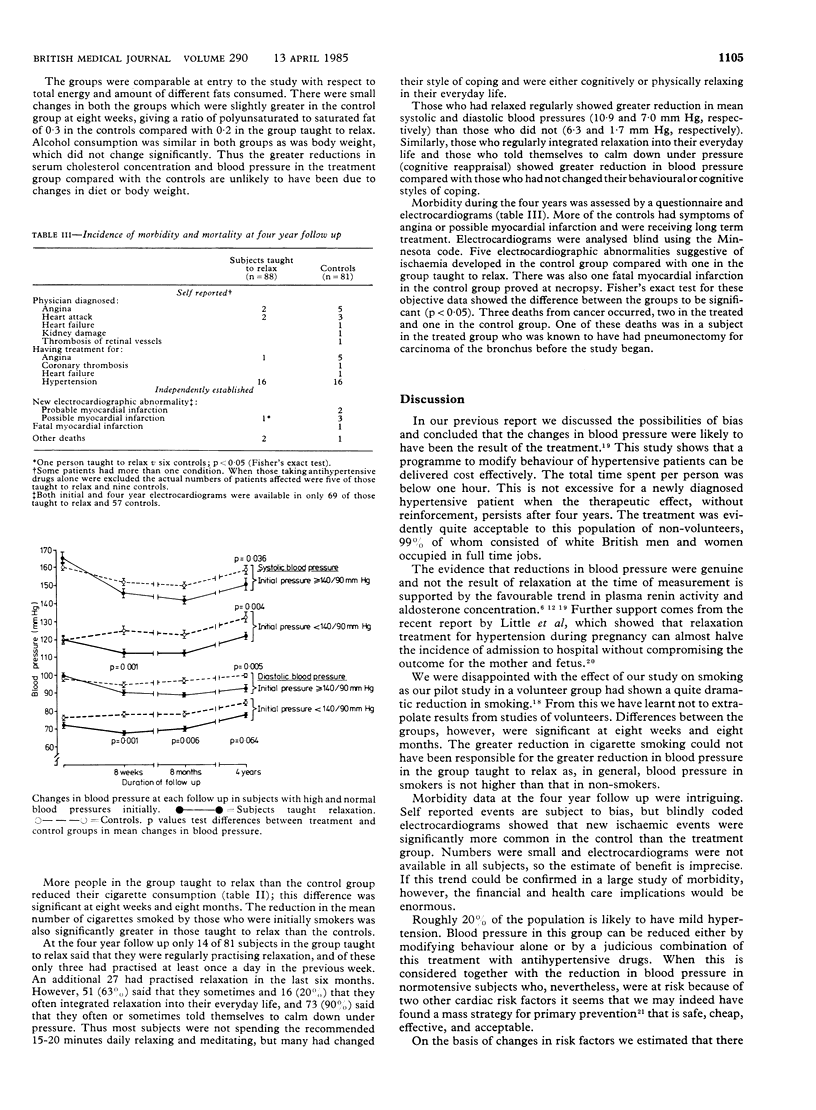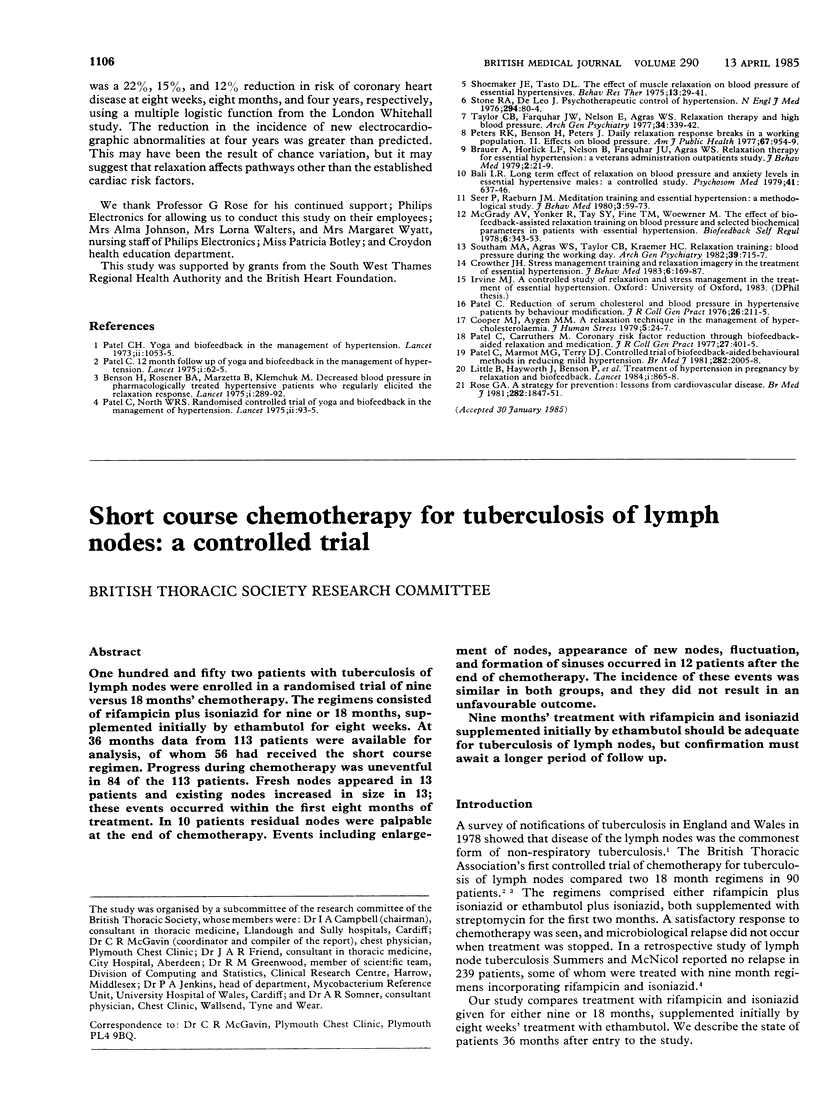Abstract
On screening 192 men and women aged 35-64 were identified as having two or more of the following risk factors: blood pressure greater than or equal to 140/90 mm Hg, plasma cholesterol concentration greater than or equal to 6.3 mmol/l (243.6 mg/100 ml), and current smoking habit greater than or equal to 10 cigarettes a day. They were randomly allocated to a group for modification of behaviour or to serve as controls. Both groups were given health education leaflets containing advice to stop smoking, to reduce animal fats in the diet, and on the importance of reducing blood pressure. In addition, the treatment group had group sessions of one hour a week for eight weeks in which they were taught breathing exercises, relaxation, and meditation and about managing stress. It had previously been found that after eight weeks and eight months there was a significantly greater reduction in both systolic and diastolic blood pressures in the group taught to relax compared with the control group. After four years of follow up these differences in blood pressure were maintained. Plasma cholesterol concentration and the number of cigarettes smoked were lower in the treatment group at eight weeks and eight months but not at the four year follow up. At four years more subjects in the control group reported having had angina and treatment for hypertension and its complications. Incidence of ischaemic heart disease, fatal myocardial infarction, or electrocardiographic evidence of ischaemia was significantly greater in the control group. If the results of this study could be obtained in a larger study the financial and health care implications would be enormous.
Full text
PDF



Selected References
These references are in PubMed. This may not be the complete list of references from this article.
- Bali L. R. Long-term effect of relaxation on blood pressure and anxiety levels of essential hypertensive males: a controlled study. Psychosom Med. 1979 Dec;41(8):637–646. doi: 10.1097/00006842-197912000-00005. [DOI] [PubMed] [Google Scholar]
- Benson H., Rosner B. A., Marzetta B. R., Klemchuk H. M. Decreased blood-pressure in pharmacologically treated hypertensive patients who regularly elicited the relaxation response. Lancet. 1974 Feb 23;1(7852):289–291. doi: 10.1016/s0140-6736(74)92596-3. [DOI] [PubMed] [Google Scholar]
- Crowther J. H. Stress management training and relaxation imagery in the treatment of essential hypertension. J Behav Med. 1983 Jun;6(2):169–187. doi: 10.1007/BF00845379. [DOI] [PubMed] [Google Scholar]
- Little B. C., Hayworth J., Benson P., Hall F., Beard R. W., Dewhurst J., Priest R. G. Treatment of hypertension in pregnancy by relaxation and biofeedback. Lancet. 1984 Apr 21;1(8382):865–867. doi: 10.1016/s0140-6736(84)91337-0. [DOI] [PubMed] [Google Scholar]
- McGrady A. V., Yonker R., Tan S. Y., Fine T. H., Woerner M. The effect of biofeedback-assisted relaxation training on blood pressure and selected biochemical parameters in patients with essential hypertension. Biofeedback Self Regul. 1981 Sep;6(3):343–353. doi: 10.1007/BF01000659. [DOI] [PubMed] [Google Scholar]
- Patel C. 12-month follow-up of yoga and bio-feedback in the management of hypertension. Lancet. 1975 Jan 11;1(7898):62–64. doi: 10.1016/s0140-6736(75)91070-3. [DOI] [PubMed] [Google Scholar]
- Patel C., Carruthers M. Coronary risk factor reduction through biofeedback-aided relaxation and meditation. J R Coll Gen Pract. 1977 Jul;27(180):401–405. [PMC free article] [PubMed] [Google Scholar]
- Patel C., Marmot M. G., Terry D. J. Controlled trial of biofeedback-aided behavioural methods in reducing mild hypertension. Br Med J (Clin Res Ed) 1981 Jun 20;282(6281):2005–2008. doi: 10.1136/bmj.282.6281.2005. [DOI] [PMC free article] [PubMed] [Google Scholar]
- Patel C., North W. R. Randomised controlled trial of yoga and bio-feedback in management of hypertension. Lancet. 1975 Jul 19;2(7925):93–95. doi: 10.1016/s0140-6736(75)90002-1. [DOI] [PubMed] [Google Scholar]
- Patel C. Reduction of serum cholesterol and blood pressure in hypertensive patients by behaviour modification. J R Coll Gen Pract. 1976 Mar;26(164):211–215. [PMC free article] [PubMed] [Google Scholar]
- Peters R. K., Benson H., Peters J. M. Daily relaxation response breaks in a working population: II. Effects on blood pressure. Am J Public Health. 1977 Oct;67(10):954–959. doi: 10.2105/ajph.67.10.954. [DOI] [PMC free article] [PubMed] [Google Scholar]
- Rose G. Strategy of prevention: lessons from cardiovascular disease. Br Med J (Clin Res Ed) 1981 Jun 6;282(6279):1847–1851. doi: 10.1136/bmj.282.6279.1847. [DOI] [PMC free article] [PubMed] [Google Scholar]
- Seer P., Raeburn J. M. Meditation training and essential hypertension: a methodological study. J Behav Med. 1980 Mar;3(1):59–71. doi: 10.1007/BF00844914. [DOI] [PubMed] [Google Scholar]
- Shoemaker J. E., Tasto D. L. The effects of muscle relaxation on blood pressure of essential hypertensives. Behav Res Ther. 1975 Feb;13(1):29–43. doi: 10.1016/0005-7967(75)90049-2. [DOI] [PubMed] [Google Scholar]
- Southam M. A., Agras W. S., Taylor C. B., Kraemer H. C. Relaxation training. Blood pressure lowering during the working day. Arch Gen Psychiatry. 1982 Jun;39(6):715–717. doi: 10.1001/archpsyc.1982.04290060061012. [DOI] [PubMed] [Google Scholar]
- Taylor C. B., Farquhar J. W., Nelson E., Agras S. Relaxation therapy and high blood pressure. Arch Gen Psychiatry. 1977 Mar;34(3):339–342. doi: 10.1001/archpsyc.1977.01770150097011. [DOI] [PubMed] [Google Scholar]


